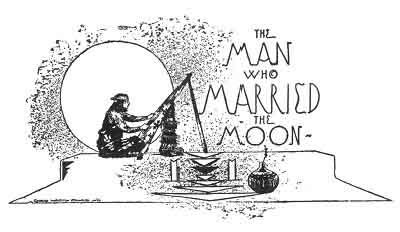
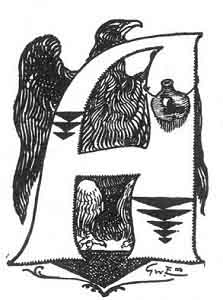 |
feats and startling adventures--as still related by the believing Isleteños--would fill a volume. One of these fanciful myths has interested me particularly, not only for its important bearing on certain ethnological matters, but for its intrinsic qualities as well. It is a thoroughly characteristic leaf from the legendary lore of the Southwest.
Long before the first Spaniards came to New Mexico (and that was three hundred and fifty years ago) Isleta stood where it stands to-day--on a lava ridge that defies the gnawing current of the Rio Grande. 1 In those far days, Nah-chu-rú-chu dwelt in Isleta, and was a leader of his people. A weaver by trade, 2 his rude loom hung from the dark rafters of his room; and in it he wove the strong black mantas which are the dress of Pueblo women to this day.
Besides being very wise in medicine, Nah-chu-rú-chu was young, and tall, and strong, and handsome; and all the girls of the village thought it a shame that he did not care to take a wife. For him the shyest dimples played, for him the whitest teeth flashed out, as the owners passed him in the plaza; but he had no eyes for them. Then, in the naïve custom of the Tée-wahn, bashful fingers worked wondrous fringed shirts of buckskin, or gay awl-sheaths, which found their way to his house by unknown messengers--each as much as
to say, "She who made this is yours, if you will have her." But Nah-chu-rú-chu paid no more attention to the gifts than to the smiles, and just kept weaving and weaving--such mantas as were never seen in the land of the Tée-wahn before or since.
The most persistent of his admirers were two sisters who were called Ee-eh-chóo-ri-ch'áhm-nin--the Yellow-Corn-Maidens. They were both young and pretty, but they "had the evil road"--which is the Indian way of saying that they were possessed of a magic power which they always used for ill. When all the other girls gave up, discouraged at Nah-chu-rú-chu's indifference, the Yellow-Corn-Maidens kept coming day after day, trying to attract him. At last the matter became such a nuisance to Nah-chu-rú-chu that he hired the deep-voiced town-crier to go through all the streets and announce that in four days Nah-chu-rú-chu would choose a wife.
For dippers, to take water from the big earthen tinajas, the Tée-wahn used then, as they use today, queer little ladle-shaped omates made of a gourd; but Nah-chu-rú-chu, being a great medicine-man and very rich, had a dipper of pure pearl, shaped like the gourds, but wonderfully precious.
"On the fourth day," proclaimed the crier,
Nah-chu-rú-chu will hang his pearl omate at his door, where every girl who will may throw a handful of corn-meal at it. And she whose meal is so well ground that it sticks to the omate, she shall be the wife of Nah-chu-rú-chu!"
When this strange news came rolling down the still evening air, there was a great scampering of
little moccasined feet. The girls ran out from hundreds of gray adobe houses to catch every word; and when the crier had passed on, they ran back into the store-rooms and began to ransack the corn-bins for the biggest, evenest, and most perfect ears. Shelling the choicest, each took her few handfuls of kernels to the sloping metate, 1 and

Click to enlarge
THE ISLETA GIRLS GRINDING CORN WITH THE ''MANO'' ON THE ''METATE.''
with the mano, or hand-stone, scrubbed the grist up and down, and up and down, till the hard corn was a soft, blue meal. All the next day, and the next, and the next, they ground it over and over again, until it grew finer than ever flour was before; and every girl felt sure that her meal would stick to the omate of the handsome young weaver. The Yellow-Corn-Maidens worked hardest of all; day and night for four days they ground and ground, with all the magic spells they knew.
Now, in those far-off days the Moon had not gone up into the sky to live, but was a maiden of Shee-eh-whíb-bak. And a very beautiful girl she was, though blind of one eye. She had long admired Nah-chu-rú-chu, but was always too maidenly to try to attract his attention as other girls had done; and at the time when the crier made his proclamation,
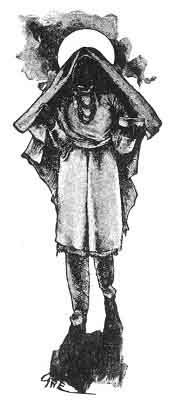 THE MOON-MAIDEN. |
By this time a long file of girls was coming to Nah-chu-rú-chu's house, outside whose door hung the pearl omate. Each girl carried in her left hand a little jar of meal; and as they passed the door one by one, each took from the jar a handful and threw it against
the magic dipper. But each time the meal dropped to the ground, and left the pure pearl undimmed and radiant as ever.
At last came the Yellow-Corn-Maidens, who had waited to watch the failure of the others. As they came where they could see Nah-chu-rú-chu sitting at his loom, they called: "Ah! Here we have the meal that will stick!" and each threw a handful at the omate. But it did not stick at all; and still from his seat Nah-chu-rú-chu could see, in that mirror-like surface, all that went on outside.
The Yellow-Corn-Maidens were very angry, and instead of passing on as the others had done, they stood there and kept throwing and throwing at the omate, which smiled back at them with undiminished luster.
Just then, last of all, came the Moon, with a single handful of meal which she had hastily ground. The two sisters were in a fine rage by this time, and mocked her, saying:
"Hoh! P'áh-hlee-oh, 1 you poor thing, we are very sorry for you! Here we have been grinding our meal four days and still it will not stick, and you we did not tell till to-day. How, then, can you ever hope to win Nah-chu-rú-chu? Pooh, you silly little thing!"
But the Moon paid no attention whatever to their taunts. Drawing back her little dimpled hand, she threw the meal gently against the pearl omate, and so fine was it ground that every tiniest bit of it clung to the polished shell, and not a particle fell to the ground.
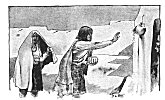
Click to enlarge
THE YELLOW-CORN-MAIDENS THROWING MEAL AT THE ''OMATE''
When Nah-chu-rú-chu saw that, he rose up quickly from his loom and came and took the Moon by the hand, saying, "You are she who shall be my wife. You shall never want for anything, since I have very much." And he gave her many beautiful mantas, and cotton wraps, and fat boots of buckskin that wrap round and round, that she might dress as the wife of a rich chief. But the Yellow-Corn-Maidens, who had seen it all, went away vowing vengeance on the Moon.
Nah-chu-rú-chu and his sweet Moon-wife were very happy together. There was no other such housekeeper in all the pueblo as she, and no other hunter brought home so much buffalo-meat from the vast plains to the east, nor so many antelopes, and black-tailed deer, and jack-rabbits from the Manzanos as did Nah-chu-rú-chu. But he constantly was saying to her:
"Moon-wife, beware of the Yellow-Corn-Maidens, for they have the evil road and will try to do you harm, but you must always refuse to do whatever they propose." And always the young wife promised.
One day the Yellow-Corn-Maidens came to the house and said:
"Friend Nah-chu-rú-chu, we are going to the llano 1 to gather amole. 2 Will you not let your wife go with us?"
"Oh, yes, she may go," said Nah-chu-rú-chu; but taking her aside, he said, "Now be sure that you refuse whatever they may propose."
The Moon promised, and started away with the Yellow-Corn-Maidens.
In those days there was only a thick forest of cottonwoods where are now the smiling vineyards, and gardens, and orchards of Isleta, and to reach the llano the three women had to go through this forest. In the very center of it they came to a deep pozo--a square well, with steps at one side leading down to the water's edge.
"Ay!" said the Yellow-Corn-Maidens, "how hot and thirsty is our walk! Come, let us get a drink of water."
But the Moon, remembering her husband's words, said politely that she did not wish to drink. They urged in vain, but at last, looking down into the pozo, called:
"Oh, Moon-friend! Come and look in this still water, and see how pretty you are!"
The Moon, you must know, has always been just as fond of looking at herself in the water as she is to this very day, and forgetting Nah-chu-rú-chu's warning, she came to the brink, and looked down upon her fair reflection. But at that very moment, the two witch-sisters pushed her head foremost into the pozo, and drowned her; and then filled the well with earth, and went away as happy as wicked hearts can be.
Nah-chu-rú-chu began to look oftener from his loom to the door as the sun crept along the adobe floor, closer and closer to his seat; and when the shadows were very long, he sprang suddenly to his feet, and walked to the house of the Yellow-Corn-Maidens with long, strong strides.
"Ee-eh-chóo-ri-ch'áhm-nin," he said, very sternly, "where is my little wife?"
"Why, is n't she at home?" asked the wicked sisters as if in great surprise. "She got enough amole long before we did, and started home with it. We supposed she had come long ago."
"Ah," groaned Nah-chu-rú-chu within himself; "it is as I thought--they have done her ill." But without a word to them he turned on his heel and went away.
From that hour all went ill with Isleta, for Nah-chu-rú-chu held the well-being of all his people, even unto life and death. Paying no attention to what was going on about him, he sat motionless upon the very crosspiece of the estufa ladder--the highest point in all the town--with his head bowed upon his hands. There he sat for days, never speaking, never moving. The children that played along the streets looked up to the motionless figure, and ceased their boisterous play. The old men shook their heads gravely, and muttered: "We are in evil times, for Nah-chu-rú-chu is mourning, and will not be comforted. And there is no more rain, so that our crops are drying in the fields. What shall we do?"
At last all the councilors met together, and decided that there must be another effort made to find the lost wife. It was true that the great Nah-chu-rú-chu had searched for her in vain, and the people had helped him; but perhaps some one else might be more fortunate. So they took some of the sacred smoking-weed wrapped in a corn-husk and went to Shée-wid-deh, who has the sharpest
eyes in all the world. Giving him the sacred gift they said:
"Eagle-friend, we see Nah-chu-rú-chu in great trouble, for he has lost his Moon-wife. Come, search for her, we pray you, if she be alive or dead."
So the Eagle took the offering, and smoked the smoke-prayer; and then he went winging upward into the very sky. Higher and higher he rose, in great upward circles, while his keen eyes noted every stick, and stone, and animal on the face of all the world. But with all his eyes, he could see nothing of the lost wife; and at last he came back sadly, and said:
"People-friends, I went up to where I could see the whole world, but I could not find her."
Then the people went with an offering to the Coyote, whose nose is sharpest in all the world; and besought him to try to find the Moon. The Coyote smoked the smoke-prayer, and started off with his nose to the ground, trying to find her tracks. He trotted all over the earth; but at last he too came back without finding what he sought.
Then the troubled people got the Badger to search, for he is best of all the beasts at digging--and he it was whom the Trues employed to dig the caves in which the people first dwelt when they came to this world. The Badger trotted and pawed, and dug everywhere, but he could not find the Moon; and he came home very sad.
Then they asked the Osprey, who can see farthest under water, and he sailed high above all the lakes and rivers in the world, till he could count the
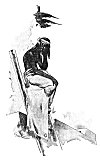
Click to enlarge
THE GRIEF OF NAH-CHU-RÚ-CHU.
pebbles and the fish in them, but he too failed to discover the lost Moon.
By now the crops were dead and sere in the fields, and thirsty animals walked crying along the dry river. Scarcely could the people themselves dig deep enough to find so much water as would keep them alive. They were at a loss which way to turn; but at last they thought: We will go to P'ah-kú-ee-teh-áy-deh, 1 who can find the dead--for surely she is dead, or the others would have found her.
So they went to him and besought him. The Turkey-buzzard wept when he saw Nah-chu-rú-chu still sitting there upon the ladder, and said: "Truly it is sad for our great friend; but for me, I am afraid to go, since they who are more mighty than I have already failed; but I will try." And spreading his broad wings he went climbing up the spiral ladder of the sky. Higher he wheeled, and higher, till at last not even the Eagle could see him. Up and up, till the hot sun began to singe his head, and not even the Eagle had ever been so high. He cried with pain, but still he kept mounting--until he was so close to the sun that all the feathers were burned from his head and neck. But he could see nothing; and at last, frantic with the burning, he came wheeling downward. When he got back to the estufa where all the people were waiting, they saw that his head and neck had been burnt bare of feathers--and from that day to this the feathers would never grow out again.
"And did you see nothing?" they all asked, when they had bathed his burns.
"Nothing," he answered, "except that when I was half-way down I saw in the middle of yon cottonwood forest a little mound covered with all the beautiful flowers in the world."
"Oh!" cried Nah-chu-rú-chu, speaking for the first time. "Go, friend, and bring me one flower from the very middle of that mound."
Off flew the Buzzard, and in a few minutes returned with a little white flower. Nah-chu-rú-chu took it, and descending from the ladder in silence, walked to his house, while all the wondering people followed.
When Nah-chu-rú-chu came inside his home once more, he took a new manta and spread it in the middle of the room; and laying the wee white flower tenderly in its center, he put another new manta above it. Then, dressing himself in the splendid buckskin suit the lost wife had made him, and taking in his right hand the sacred guaje (rattle), he seated himself at the head of the mantas and sang:
"Shú-nah, shú-nah!
Aí-ay-ay, aí-ay-ay, aí-ay-ay!"
(Seeking her, seeking her!
There-away, there-away!)
When he had finished the song, all could see that the flower had begun to grow, so that it lifted the upper manta a little. Again he sang, shaking his gourd; and still the flower kept growing. Again and again he sang; and when he had finished for the fourth time, it was plain to all that a human form lay between the two mantas. And
when he sang his song the fifth time, the form sat up and moved. Tenderly he lifted away the over-cloth, and there sat his sweet Moon-wife, fairer than ever, and alive as before! 1
For four days the people danced and sang in the public square. Nah-chu-rú-chu was happy again; and now the rain began to fall. The choked earth drank and was glad and green, and the dead crops came to life.
When his wife told him how the witch-sisters had done, he was very angry; and that very day he made a beautiful hoop to play the mah-khúr. He painted it, and put strings across it, decorated with beaded buckskin.
"Now," said he, "the wicked Yellow-Corn-Maidens will come to congratulate you, and will pretend not to know where you were. You must not speak of that, but invite them to go out and play a game with you."
In a day or two the witch-sisters did come, with deceitful words; and the Moon invited them to go out and play a game. They went up to the edge of the llano, and there she let them get a glimpse of the pretty hoop.
"Oh, give us that, Moon-friend," they teased. But she refused. At last, however, she said:
"Well, we will play the hoop-game. I will stand here, and you there; and if, when I roll it to you, you catch it before it falls upon its side, you may have it."
So the witch-sisters stood a little way down the hill, and she rolled the bright hoop. As it came trundling to them, both grasped it at the same instant; and lo! instead of the Yellow-Corn-Maidens, there were two great snakes, with tears rolling down ugly faces. The Moon came and put upon their heads a little of the pollen of the corn-blossom (still used by Pueblo snake-charmers) to tame them, and a pinch of the sacred meal for their food.
"Now," said she, "you have the reward of treacherous friends. Here shall be your home among these rocks and cliffs forever, but you must never be found upon the prairie; and you must never bite a person. Remember you are women, and must be gentle."
And then the Moon went home to her husband, and they were very happy together. As for the sister snakes, they still dwell where she bade them, and never venture away; though sometimes the people bring them to their houses to catch the mice, for these snakes never hurt a person.
54:1 Bandelier has published a contrary opinion, to which I do not think he would now cling. The folk-lore and the very name of the town fully prove to me that its site has not changed in historic times.
54:2 In the ancient days, weaving was practised only by the men, among the Pueblos. This old usage is now reversed, and it is the women who weave, except in the pueblos Moqui.
56:1 The slab of lava which still serves as a hand-mill in Pueblo houses.
58:1 Tée-wahn name of the moon; literally, "Water-Maiden."
61:1 Plain.
61:2 The soapy root of the palmilla, used for washing.
67:1 Turkey-buzzard; literally, "water-goose-grandfather."
69:1 Nah-chu-rú-chu's incantation followed the exact form still used by the Indian conjurors of the Southwest in their wonderful trick of making corn grow and mature from the kernel in one day.